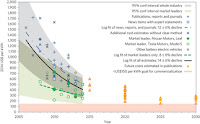Electric cars may seem like a niche product that only wealthy people can afford, but a new analysis suggests that they may be close to competing with or even beating gas cars on cost.
The true cost of lithium-ion batteries in electric cars is a secret closely held by manufacturers. And estimates of the cost vary widely, making it tough to determine just how much lower they must go before electric vehicles with long ranges can be affordable for most buyers. But a peer-reviewed study of more than 80 estimates reported between 2007 and 2014 determined that the costs of battery packs are “much lower” than widely assumed by energy-policy analysts.
The authors of the new study concluded that the battery packs used by market-leading EV manufacturers like Tesla and Nissan cost as little as $300 per kilowatt-hour of energy in 2014. That’s lower than the most optimistic published projections for 2015, and even below the average published projection for 2020. The authors found that batteries appear on track to reach $230 per kilowatt-hour by 2018.
If that’s true, it would push EVs across a meaningful threshold. Depending on the price of gas, the sticker price of an EV is expected to appeal to many more people if its battery costs between $125 and $300 per kilowatt-hour. Because the battery makes up perhaps a quarter to a half of the cost of the car, a substantially cheaper battery would make the vehicle itself significantly cheaper too. Alternatively, car makers could maintain current EV prices but offer vehicles with much longer ranges.
The range would likely be crucial for many buyers because it’s so much cheaper to “fill” an EV with electricity—charging a car with a 300-mile range could cost less than $10. Given the disparity in gasoline and electricity prices, the study’s authors, Bjӧrn Nykvist and Måns Nilsson, research fellows at the Stockholm Environment Institute, say that if batteries fall as low as $150 per kilowatt-hour, this could lead to “a potential paradigm shift in vehicle technology.”
The analysis suggests that the cost of packs used by the leading EV manufacturers is falling about 8 percent a year. Although Nykvist acknowledges that “the uncertainties are large,” he says it’s realistic to think that this rate of decline could continue in the coming years, thanks to the economies of scale that would be created if large manufacturers like Nissan and Tesla follow through with their separate plans to massively increase production.
Read more at Inexpensive Electric Cars May Arrive Sooner Than You Think

No comments:
Post a Comment